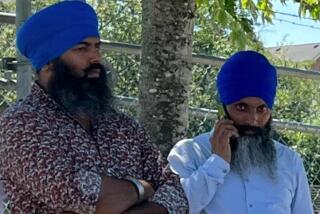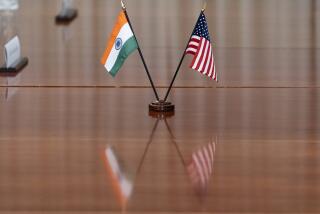Indian Official Cremated Amid Fears : Assassination: Officials say poor security led to car-bomb death of Punjab’s chief minister. Citizens wonder if Sikh separatist violence is resuming.
- Share via
NEW DELHI — To the booming of guns and the trill of army bugles, the mangled remains of Punjab’s chief minister were burned on a funeral pyre with full state honors Saturday as Indians wondered whether a new round of bloodshed is beginning in a state just getting used to civil peace.
Government officials admitted that a security lapse led to Thursday’s murder of Beant Singh, one of the country’s most highly guarded politicians, and said that some of the very people in charge of providing him with 24-hour-a-day protection were apparently involved.
“Somebody inside the system has helped this tragedy to take place,” Rajesh Pilot, India’s internal security minister, said in an interview.
Singh, 73, a member of the ruling Congress (I) Party, and at least 15 others were killed or mortally wounded when an explosion of huge force tore apart the chief minister’s bulletproof limousine in Chandigarh, Punjab’s capital.
For Punjabis and all Indians, the big question is whether the assassination portends a revival of armed Sikh separatism, which claimed the lives of more than 11,000 civilians in Punjab from the mid-1980s through the early ‘90s and, for a time, endangered the social and political fabric of India itself.
On Oct. 31, 1984, then-Prime Minister Indira Gandhi was assassinated by two of her Sikh bodyguards for having ordered Indian army units to invade the holiest site in Sikhdom, the Golden Temple in the Punjabi city of Amritsar, to dislodge armed Sikh militants who had holed up there.
Coming events in Punjab could have dangerous political consequences for India’s current prime minister, P. V. Narasimha Rao, because his embattled Congress (I) government has trumpeted its achievements there to justify its policies in another strife-ridden state, Jammu and Kashmir.
Rao flew to Chandigarh on Saturday morning to place a wreath on Singh’s bier and comfort his widow. For security reasons, Rao did not stay for the public cremation.
To shouts of “Beant Singh has become immortal!” from a crowd estimated at 15,000, the politician’s mutilated body, contained in a wooden coffin topped with an Indian tricolor, was trundled on an army gun carriage along a four-mile route through Chandigarh.
Despite the bombing’s deadly toll, knowledgeable observers of affairs in Punjab doubt that the armed struggle for a separate Sikh state, known as Khalistan, can be revived. Under a controversial police operation that reached its crescendo after Singh became the state’s leader in February, 1992, more than 8,000 alleged “terrorists” were killed.
T. R. Ramaswamy, deputy editor of the Tribune, a Chandigarh daily, said authorities did such a thorough job of hunting down militants and sealing the Pakistani border to prevent them from smuggling in weapons that the Khalistan movement is now limited to “100 people spread across the state who can’t even communicate with each other.”
“This bombing has happened not because the militants, the people of the gun, are gaining the upper hand but because the people supposed to guard the CM [chief minister] let him down,” Ramaswamy said.
Officials said Saturday that 16 police officers have been suspended for security lapses that allowed the assassination to take place. They did not elaborate.
The national government’s Central Bureau of Investigation has offered 1 million rupees, or more than $32,400, for clues leading to an arrest.
Police are also seeking two men, 23 or 24, described as looking like “educated college students,” who were seen loitering in the vicinity of the bombing.
A claim of responsibility for the blast was quickly made on behalf of one militant Sikh group, the Babbar Khalsa International. Within 24 hours of the bombing, however, officials were pondering whether another extremist faction, the Khalistan Liberation Force, might have been behind the attack, since that faction is thought to have expertise in the use of explosives.
More to Read
Sign up for Essential California
The most important California stories and recommendations in your inbox every morning.
You may occasionally receive promotional content from the Los Angeles Times.













